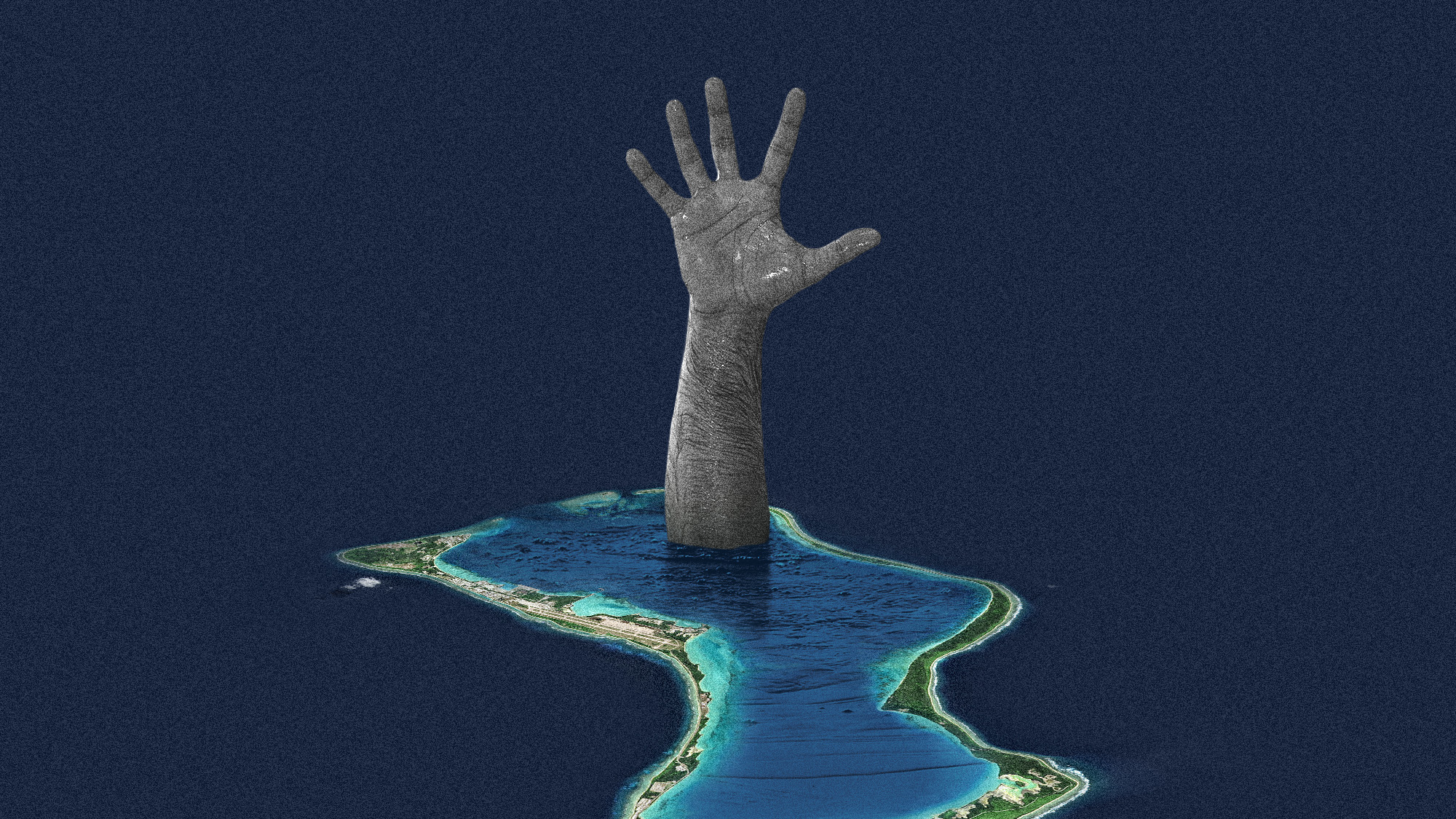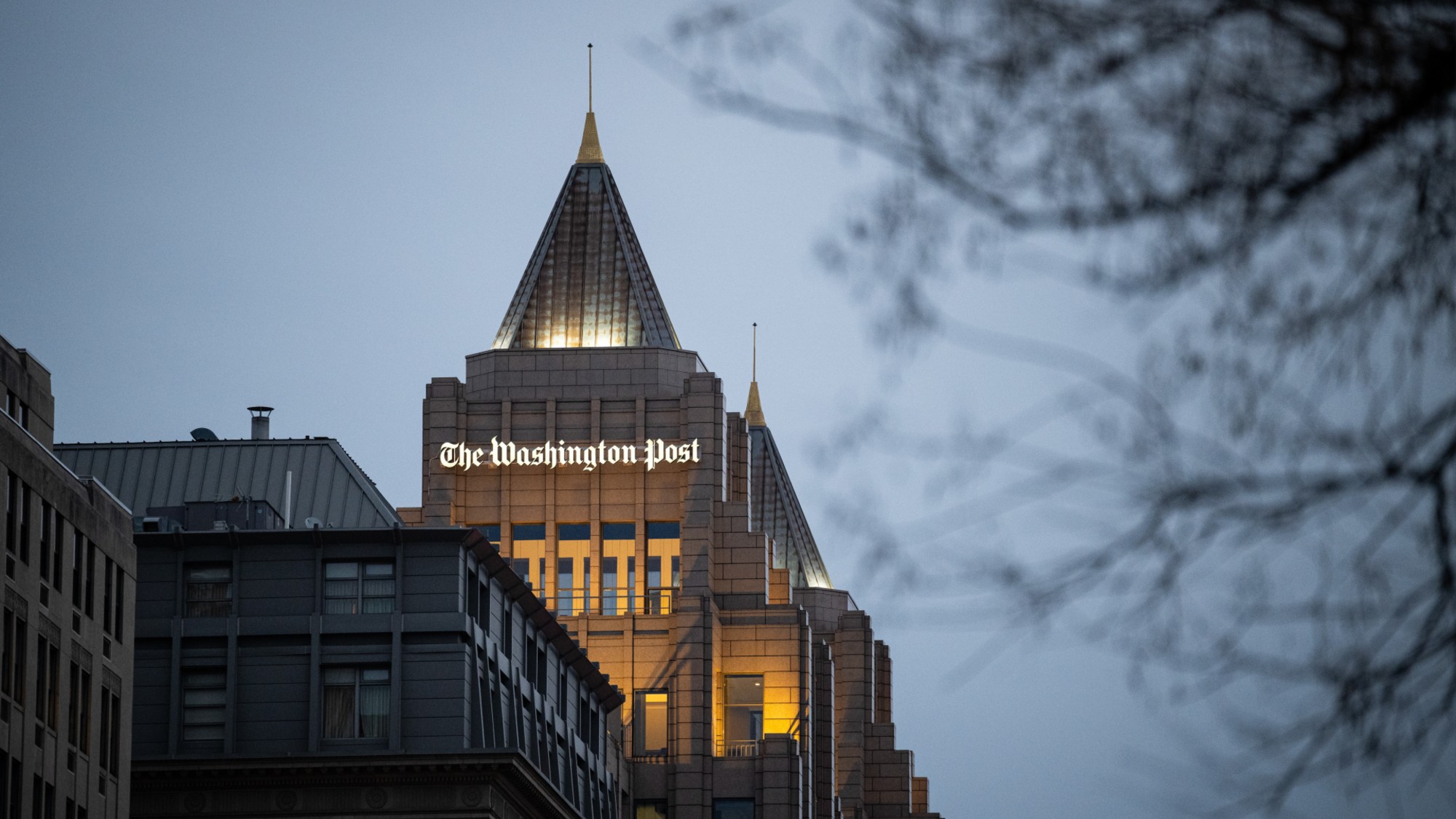The Tamils stranded on 'secretive' British island in Indian Ocean
Migrants 'unlawfully detained' since 2021 shipwreck on UK-controlled Diego Garcia, site of important US military base

A free daily email with the biggest news stories of the day – and the best features from TheWeek.com
You are now subscribed
Your newsletter sign-up was successful
A paradise island in the Indian Ocean has become the centre of a complex legal dispute, a battle for control – and a "prison" for stranded migrants.
In 2021, Sri Lankan Tamils fleeing persecution attempted to sail to Canada to claim asylum, when their fishing boat suffered a leak. British navy ships rescued dozens and brought them to Diego Garcia, the largest of the disputed Chagos Islands in the British Indian Ocean Territory (Biot) – long claimed by Mauritius – and site of a secretive military base leased by the UK to the US. The group of 60, including at least 16 children, claim to have been "unlawfully detained" since: the first people to file asylum claims in the Biot.
The territory's Supreme Court was due to rule on the claim last week, but hours before the judge and lawyers got on the US military plane to start their journey, the US cancelled the hearing. Officials said they were "withdrawing its consent" for access to the "heavily restricted" island, with communication seen by the BBC describing the reasons as "confidential" – but that the visit presented "risks to the security and effective operation" of the base.
The Week
Escape your echo chamber. Get the facts behind the news, plus analysis from multiple perspectives.

Sign up for The Week's Free Newsletters
From our morning news briefing to a weekly Good News Newsletter, get the best of The Week delivered directly to your inbox.
From our morning news briefing to a weekly Good News Newsletter, get the best of The Week delivered directly to your inbox.
But parts of the island where access was denied (such as a gym and a swimming pool) were visited by US cheerleaders and celebrity chefs earlier this year. The fact that the Biot Supreme Court has been "prevented from sitting in its own territory on Crown land is an extraordinary affront to the rule of law", said Tessa Gregory, a partner at Leigh Day, the London-based solicitors representing the Tamils.
The dispute over the Chagos Islands
Diego Garcia is the largest of the Chagos Islands, an archipelago about 310 miles south of The Maldives. The Biot is constitutionally separate from the UK, but administered from London.
The UK took the Chagos Islands from its then colony Mauritius in 1965 and evicted the population of more than 1,000 people, to build a military base. It signed an agreement in 1966 to lease the base to the US for 50 years, which has been extended and is now set to expire in 2036. So although Diego Garcia is technically in a British territory, most of the island is under US military control, including the accommodation and transport.
The US has sent planes from Diego Garcia to bomb Afghanistan and Iraq, while two B52 bombers were sent there for training earlier this year. The CIA has also denied allegations that it has been used as a base to interrogate terror suspects after 9/11.
A free daily email with the biggest news stories of the day – and the best features from TheWeek.com
Since Mauritius gained its independence in 1968, it has claimed ownership of the islands. In 2000, the British High Court ruled that the forceful eviction of Chagossians had been illegal, and granted them right of return – to any island except Diego Garcia.
The International Court of Justice ruled in 2019 that the UK's control of the whole territory was "unlawful" and should end. In 2021, a separate UN maritime court found that the UK's control of the islands amounted to an "unlawful occupation".
But "regardless of widespread international opinion in favour of Mauritius, London has largely ignored these decisions", said Foreign Policy. The UK government also argues that the refugee convention does not apply there.
Foreign Office plans to give the Chagos Islands back to Mauritius in a "Cyprus-style deal" were scrapped earlier this year, said The Telegraph. Then defence secretary Grant Shapps "urged" David Cameron not to cede the islands to Mauritius – a growing ally of China.
The plight of migrants on Diego Garcia
"In many ways, the island – with its pure white sands, palm trees and azure seas – looks a lot like paradise", said The Guardian. But for the 60 asylum seekers, "that idyll could not be further from their reality" – they remain "stuck there" in a "desperate, dangerous limbo".
They are forced to live in a "makeshift tented camp the size of a football pitch, surrounded by a 7ft-high metal fence". The tents are "infested with rats, mice and cockroaches". One person told the paper: "My mental state is deteriorating. I live in a body that has no life inside it".
Many of the detainees "say they are escaping torture and persecution by either Sri Lankan security forces" due to their Tamil ethnicity, said The New Humanitarian, or Indian security forces due to being Sri Lankan refugees.
But on Diego Garcia, guarded by private security company G4S, "they are treating us like prisoners", two asylum seekers said in an anonymous written statement. A G4S spokesperson denied the claims, saying the company "treats the migrants on the island with dignity and respect at all times".
But there have been "multiple suicide attempts" and "reports of sexual harassment and assaults", said the BBC. Some have been flown to Rwanda for medical treatment, but remain under Biot administration. "During Tuesday’s virtual hearing, one of the migrants on the island collapsed multiple times."
Last year, UN representatives who visited the camp reported that "conditions there amounted to arbitrary detention". The Foreign Office has also said that the island is not suitable for migrants. A ruling in their favour could allow them to claim compensation for years of detention, as well as having implications for Chagossians' calls for reparations for their eviction.
The asylum seekers are "pinning all their hopes on their legal teams to get them off the island and to a place of safety where their troubled children can thrive", said The Guardian. One told the paper: "We hope we will be allowed to escape from hell."
Harriet Marsden is a senior staff writer and podcast panellist for The Week, covering world news and writing the weekly Global Digest newsletter. Before joining the site in 2023, she was a freelance journalist for seven years, working for The Guardian, The Times and The Independent among others, and regularly appearing on radio shows. In 2021, she was awarded the “journalist-at-large” fellowship by the Local Trust charity, and spent a year travelling independently to some of England’s most deprived areas to write about community activism. She has a master’s in international journalism from City University, and has also worked in Bolivia, Colombia and Spain.
-
 5 calamitous cartoons about the Washington Post layoffs
5 calamitous cartoons about the Washington Post layoffsCartoons Artists take on a new chapter in journalism, democracy in darkness, and more
-
 Political cartoons for February 14
Political cartoons for February 14Cartoons Saturday's political cartoons include a Valentine's grift, Hillary on the hook, and more
-
 Tourangelle-style pork with prunes recipe
Tourangelle-style pork with prunes recipeThe Week Recommends This traditional, rustic dish is a French classic
-
 How corrupt is the UK?
How corrupt is the UK?The Explainer Decline in standards ‘risks becoming a defining feature of our political culture’ as Britain falls to lowest ever score on global index
-
 Vietnam’s ‘balancing act’ with the US, China and Europe
Vietnam’s ‘balancing act’ with the US, China and EuropeIn the Spotlight Despite decades of ‘steadily improving relations’, Hanoi is still ‘deeply suspicious’ of the US as it tries to ‘diversify’ its options
-
 The ‘mad king’: has Trump finally lost it?
The ‘mad king’: has Trump finally lost it?Talking Point Rambling speeches, wind turbine obsession, and an ‘unhinged’ letter to Norway’s prime minister have caused concern whether the rest of his term is ‘sustainable’
-
 Does standing up to Trump help world leaders at home?
Does standing up to Trump help world leaders at home?Today’s Big Question Mark Carney’s approval ratings have ‘soared to new highs’ following his Davos speech but other world leaders may not benefit in the same way
-
 Le Pen back in the dock: the trial that’s shaking France
Le Pen back in the dock: the trial that’s shaking FranceIn the Spotlight Appealing her four-year conviction for embezzlement, the Rassemblement National leader faces an uncertain political future, whatever the result
-
 ‘It may portend something more ominous’
‘It may portend something more ominous’Instant Opinion Opinion, comment and editorials of the day
-
 The high street: Britain’s next political battleground?
The high street: Britain’s next political battleground?In the Spotlight Mass closure of shops and influx of organised crime are fuelling voter anger, and offer an opening for Reform UK
-
 EU-Mercosur mega trade deal: 25 years in the making
EU-Mercosur mega trade deal: 25 years in the makingThe Explainer Despite opposition from France and Ireland among others, the ‘significant’ agreement with the South American bloc is set to finally go ahead